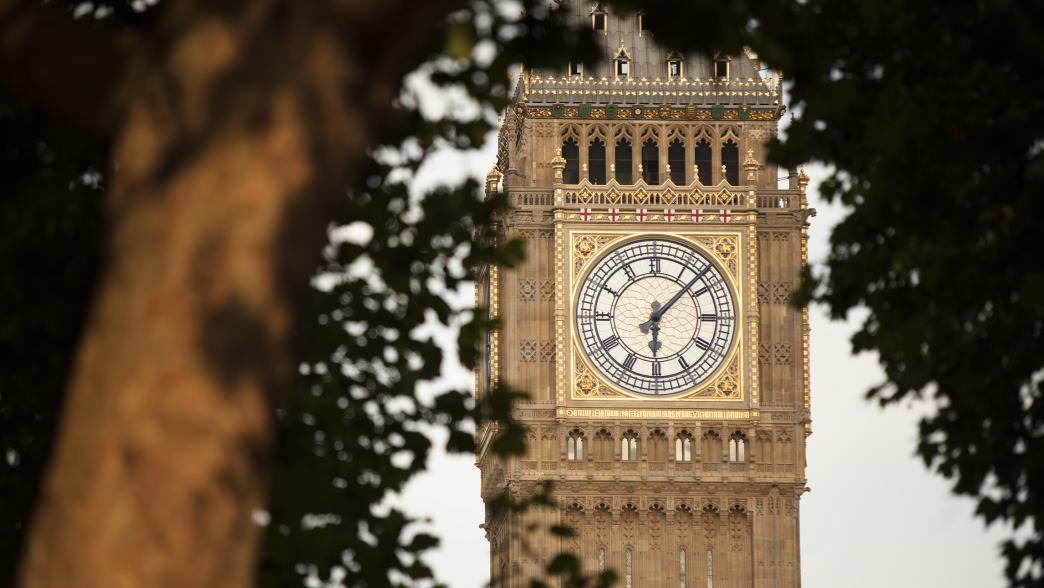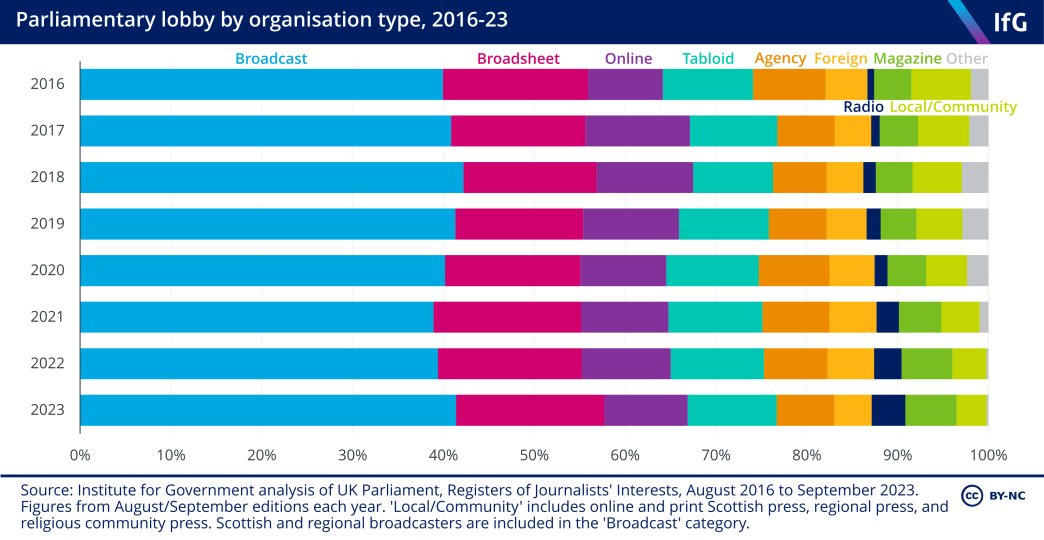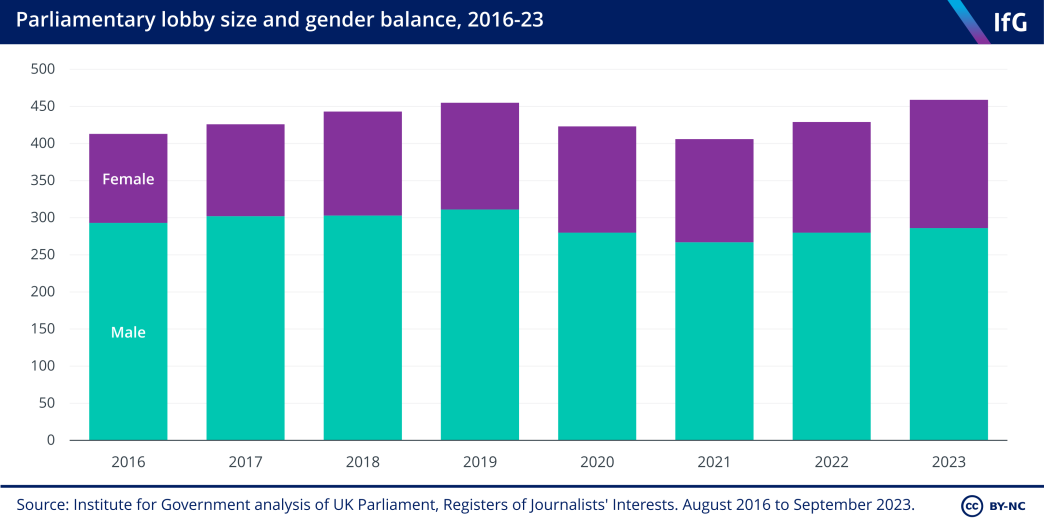Parliamentary lobby
The term ‘lobby’ is used to describe the group of journalists who cover political events in the UK.

What is the parliamentary lobby?
The term ‘lobby’ is used to describe the group of journalists who cover political events in the UK and relates to the special access they are granted to the ‘members’ lobby’ in the Palace of Westminster. The members’ lobby is effectively a large hallway in which members of parliament have traditionally gathered for discussions. To gain access to the lobby, journalists must receive the assent of the serjeant at arms, who is responsible for keeping order within the House of Commons.
What do lobby journalists do?
Lobby journalists report on political events and relationships, analysing what different actors in politics think of particular government decisions and assessing the changing relationships and power dynamics across Westminster. Journalist Ailbhe Rea argued that “what’s important is finding out what’s being said behind closed doors… lobby journalists love the gossip and the human drama side of thing.” 40 Rea A, ‘Inside the Lobby: Westminster’s political journalists, podcast, Politico, 27 May 2022, www.politico.eu/podcast/the-lobby-westminsters-political-journalists-andrew-marr-alan-rusbridger-harry-cole-aletha-adu-ali-donnelly/ Under the so-called “lobby rule”, much of the information gathered in this way is reported anonymously, attributed simply to ‘government sources’ or the like.
Lobby journalists also attend daily lobby briefings, when they can ask questions to the prime minister’s official spokesperson – a civil servant. These briefings occur twice a day, with the second one being a more informal discussion. They used to take place in the House of Commons, but have been held in Downing Street since 2020. 41 Martison J, ‘The Westminster lobby system is at the heart of a press freedom fight’, The Guardian, 19 January 2020, www.theguardian.com/media/commentisfree/2020/jan/19/the-westminster-lobby-system-is-at-the-heart-of-a-press-freedom-fight
Lobby journalists say that there are benefits to working together, including at the briefing sessions, when they can hold the prime minister’s spokesperson to account and ensure that unanswered questions are followed up. Even though lobby journalists work for different organisations, they tend to build close working relationships with one another and may collaborate and share information from time to time.
Who is in the lobby?
The lobby consists of journalists from a wide range of outlets, including broadcasters and newspapers. As of September 2023, there were 459 lobby journalists. 42 House of Commons, Register of Journalists’ Interests (as at 1 September 2023) More than 40% of these journalists worked for broadcasters, including 90 whose passes are sponsored by the BBC alone. The foreign press is also represented in the lobby, which includes journalists from CNN (USA) and Le Monde (France).

Every year the lobby elects a chair to represent them to the government and to political parties. The lobby chair’s duties include liaising with the government on arrangements for lobby briefings and foreign trips. 43 Hugo Gye, tweet, 24 November 2023, twitter.com/HugoGye/status/1728011297340506158
The lobby also elects a chair of the press gallery, who represents journalists in their dealings with the parliamentary authorities. The press gallery chair’s responsibilities include journalists’ accommodation in the Palace of Westminster and access to parliamentary proceedings.
The political editor of the Sun, Harry Cole, is the current lobby chair, 44 Hugo Gye, tweet, 23 November 2023, twitter.com/HugoGye/status/1727744739292708988 while Lucy Fisher, the Financial Times’s Whitehall editor, serves as press gallery chair. 45 Lucy Fisher, tweet, 24 November 2023, twitter.com/LOS_Fisher/status/1727996696091639851
Ali Donnelly, a former deputy spokesperson for Theresa May, highlighted the lack of diversity in the lobby in an interview with Politico. The lobby is disproportionately middle-class and privately educated – a trend that has increased over the last decade. 46 Rea A, ‘Inside the Lobby: Westminster’s political journalists, podcast, Politico, 27 May 2022, www.politico.eu/podcast/the-lobby-westminsters-political-journalists-andrew-marr-alan-rusbridger-harry-cole-aletha-adu-ali-donnelly/ It also remains male-dominated, with men make up around 60% of the lobby, down from 70% in 2017.

How has the lobby changed over time?
The lobby emerged in the late 19th century. Around the 1870s, speaker of the House of Commons John Denison stopped the public from entering the lobby and disturbing MPs. 56 ‘The Lobby’, 6 March 2015, The Parliamentary Press Gallery, retrieved 20 February 2024, pressgallery.org.uk/2015/03/06/the-lobby/ Only those on a list held by the serjeant at arms, which included certain reports, were allowed the lobby.
Through the 20th century, the lobby reported government information on an unattributable basis, with “the very existence of the system” kept secret. This changed in the 1980s when several newspapers, led by the Independent, boycotted the lobby system. 57 Aaronovitch D, ‘The media column: The lobby system poisons political journalism’, The Independent, 7 May 2002, www.independent.co.uk/news/media/the-media-column-the-lobby-system-poisons-political-journalism-650494.html The government acknowledged the existence of lobby briefings and allowed attribution of quotes to “Downing Street sources”. 58 ‘The Lobby’, 6 March 2015, The Parliamentary Press Gallery, retrieved 20 February 2024, pressgallery.org.uk/2015/03/06/the-lobby/
Tony Blair’s director of communications, Alastair Campbell, decided to open up the lobby further, including by allowing foreign media outlets and specialists to attend lobby briefings. He also allowed for some lobby briefings to be broadcast on the BBC, in 2000, but that has not happened since. 59 White M, ‘Inside story of a Campbell briefing’ The Guardian, 15 March 2000, www.theguardian.com/politics/2000/mar/15/uk.labour
During the Covid pandemic Boris Johnson’s government had suggested it would start regular televised briefings after the prime minister decided to relocate the lobby to Downing Street. 60 Allegretti A, ‘First pictures released of Boris Johnson’s new £2.6m briefing room’, The Guardian, 15 March 2021, www.theguardian.com/politics/2021/mar/15/no-10-offers-first-sight-of-26m-white-house-style-briefing-room No such briefings have been carried out.
What is the relationship between lobby journalists and the government like?
Lobby journalists are sometime criticised for being too close to the politicians and officials who are the sources of their stories. At the same time, the government often expresses frustration with journalists for the way they write their stories.
In recent years, lobby journalists were critical of the government’s decision to move lobby briefings into Downing Street. Further tension arose during Johnson’s tenure when then-director of communications, Lee Cain, proposed only delivering a briefing to a pre-approved list of journalists, arguing that “we’re welcome to brief whoever we like, whenever we like.” 61 Waugh P, ‘Journalists walk out as Downing Street tries to ban some news outlets from briefing’, HuffPost, 3 February 2020, www.huffingtonpost.co.uk/entry/no10-walkout-journalists-lee-cain-trump_uk_5e384359c5b6f262332d9603
How has the lobby system been criticised?
Critics of the lobby system argue that it privileges political gossip and rumour over detailed scrutiny of government policy. Andrew Marr told Politico that “human relationships” between journalists and politicians are key to getting stories but that journalists must not allow these relationships to get in the way of their reporting.
Marr also discussed the risk that lobby journalists agree the story together, with each journalist taking a similar line in order to avoid missing the story. 62 Rea A, ‘Inside the Lobby: Westminster’s political journalists, podcast, Politico, 27 May 2022, www.politico.eu/podcast/the-lobby-westminsters-political-journalists-andrew-marr-alan-rusbridger-harry-cole-aletha-adu-ali-donnelly/ This can lead to important stories being missed or misrepresented.
In 2003, an independent review of government communications, chaired by the then chief executive of the Guardian Media Group, Bob Phillis, found that the lobby system was “no longer working”. 63 Phillis B, An Independent Review of Government Communications, January 2004, https://webarchive.nationalarchives.gov.uk/20100407193140/http://www.cabinetoffice.gov.uk/media/cabinetoffice/corp/assets/publications/reports/commun… The review reported that journalists disliked public information “being used as the currency in a system of favouritism”, while government ministers and officials took issue with the way their words were altered and ‘distorted’ by the media.
The review recommended that “all major government media briefings should be on the record, live on television and radio and with full transcripts available promptly online”, and that ministers “should deliver announcements … at the daily lobby briefings, which should also be televised”. None of these recommendations were followed.
More recently, critics have argued that the lobby system should be abolished as it “separates politicians from the consequences of their actions.” Journalist James Ball argued that anonymous lobby briefings prevent specialist journalists and the public from scrutinising government decisions. 64 Ball J, ‘A modest proposal for 2019: scrap the parliamentary lobby’, The Guardian, 26 December 2018, www.theguardian.com/commentisfree/2018/dec/26/scrap-parliamentary-lobby-westminster-journalists
- Legislature
- House of Commons
- Publisher
- Institute for Government